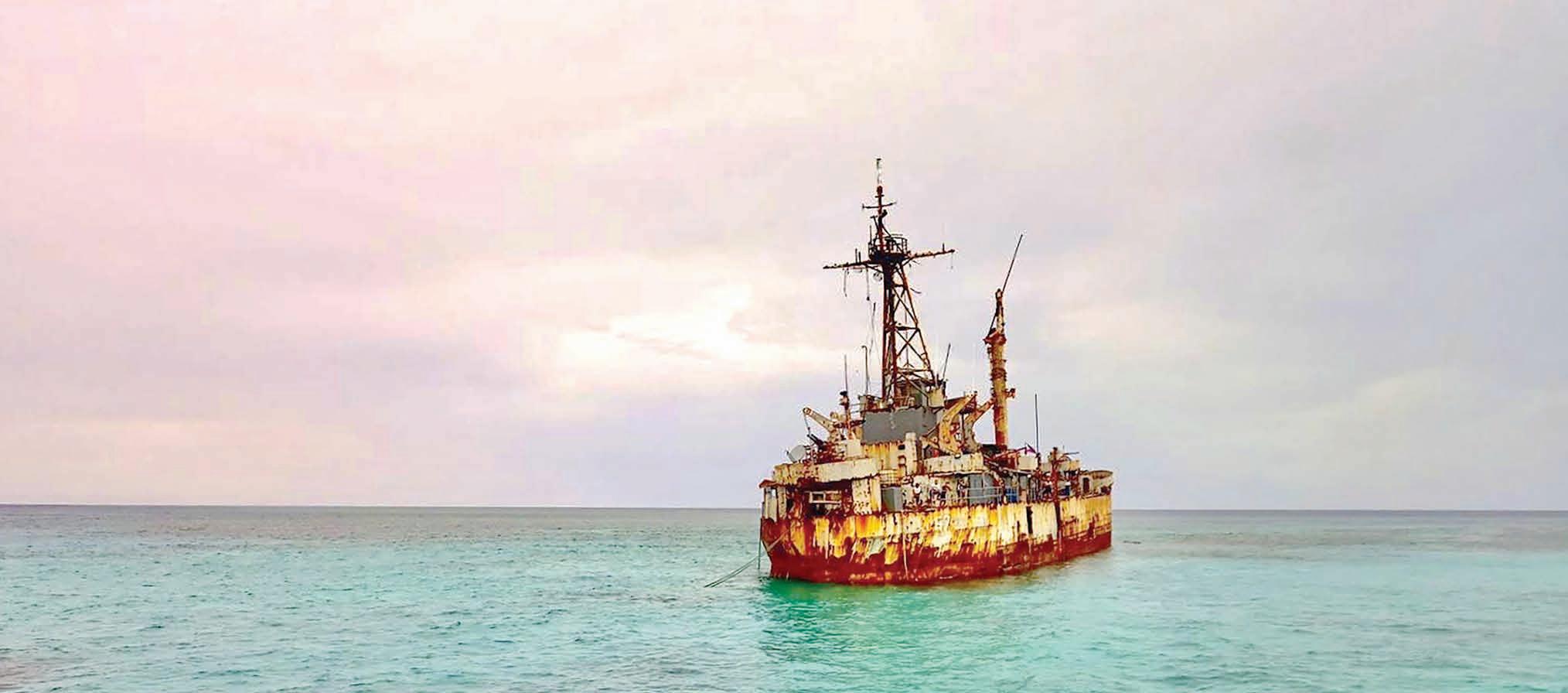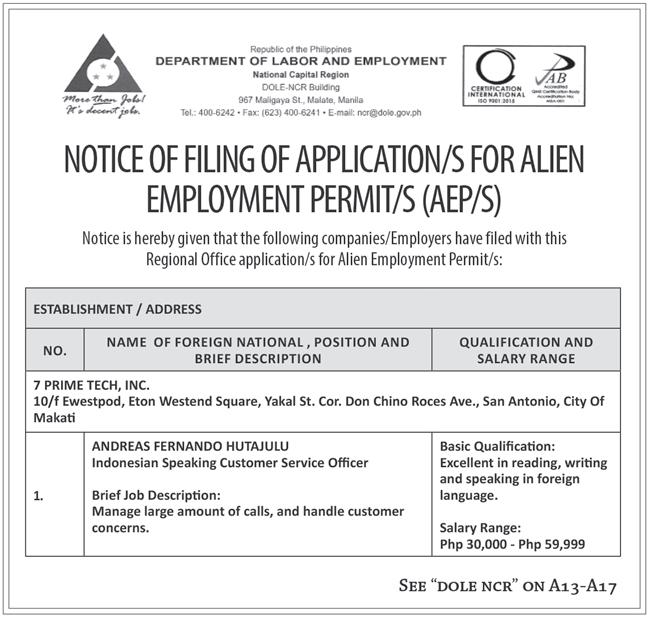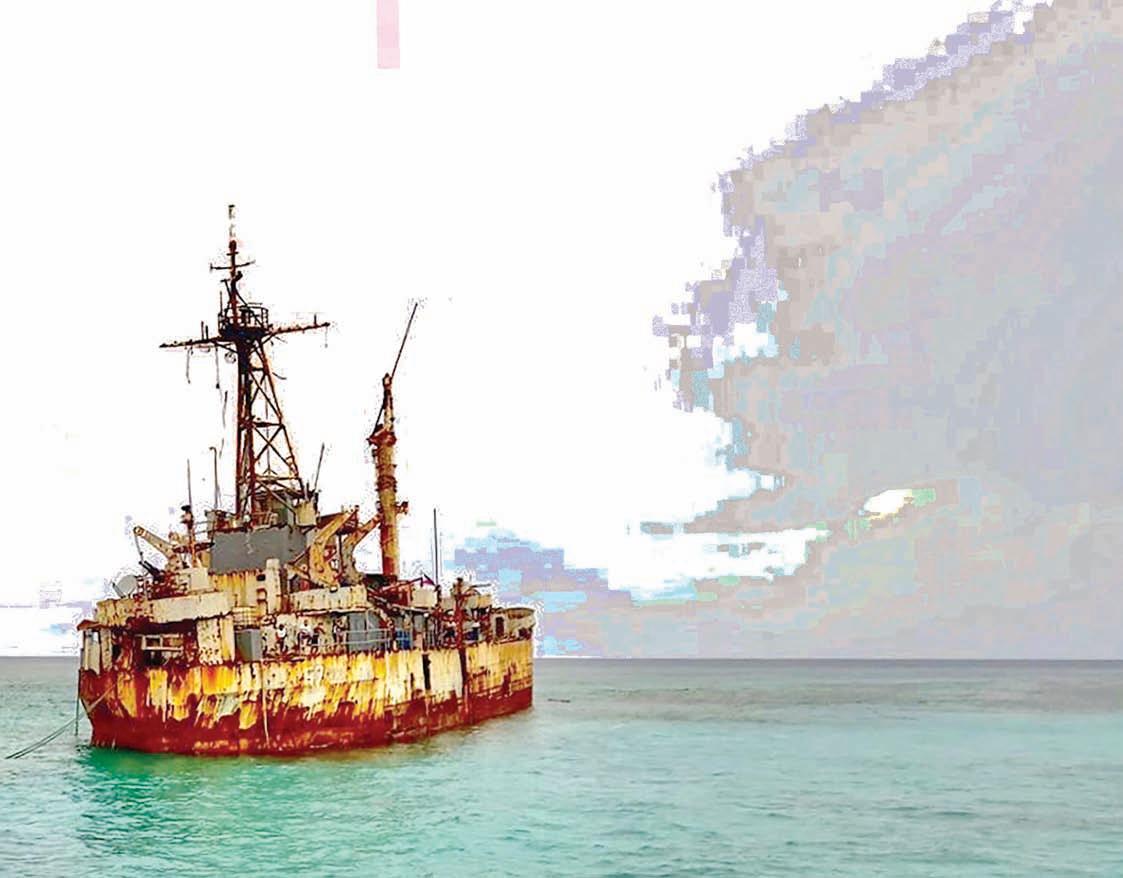
4 minute read
THE ENDURING WPS SENTINEL
PHL’s ageing naval vessel BRP Sierra Madre is again under siege
ASIDE from the unpredictable elements and relentless waves of the sea, the BRP Sierra Madre (LST-57)—the lone symbol of Philippine sovereignty and its naval sentinel in Ayungin Shoal (also known as Second Thomas Shoal) in the West Philippine Sea (WPS)—is now facing the real possibility of a Chinese blockade, which could affect the country’s capability to sustain a small number of military personnel deployed there.
W hile no conventional armed conflict has yet taken place, the August 5, 2023, incident—where China Coast Guard (CCG) and China maritime militia (CMM) vessels harassed the two smaller Filipino supply boats and their escorts until only one of the ships was able to break through and complete its replenishment mission—could be a portent of things to come as China remains adamant about claiming the above-mentioned area as her own.
In fact, China, through the spokesperson of the Chinese Foreign Ministry, justified the harassment of the Filipino supply ships and the escorting Philippine Coast Guard (PCG) vessels by claiming that these vessels intruded in its territory.
The spokesperson of China Coast Guard has given detailed information regarding the Philippines’ illegally sending construction materials to Ren’ai Jiao in China’s Nansha Qundao and the situation it caused at sea. The Chinese Foreign Ministry has lodged serious démarches to the Philippines,” it said.

A promise to leave?
CHINA also claimed that the Philippines “explicitly promised several times to tow away the military vessel deliberately and illegally ‘grounded’ at Ren’ai Jiao” in 1999.
But instead of removing the BRP Sierra Madre as promised, the Philippines, Beijing claimed, instead tried to “repair and reinforce it on a large scale in order to permanently occupy Ren’ai Jiao.”
C hina also said the Philippines’s action gravely violates international law and the Declaration on the Conduct of Parties in the South China Sea (DOC) signed between China and Asean countries.
It added that the 2016 South China Sea Arbitration Award violates international law, including the United Nations Convention for the Law of the Sea (Unclos).
PHL disputes Chinese claims
IN response to this, Department of Foreign Affairs spokesperson Ma. Teresita Daza said Ayungin Shoal, as explicitly stated in the Award by the Permanent Court of Arbitration, is a low-tide elevation that is not subject to sovereignty claims or appropriation.
It is part of the exclusive economic zone of the Philippines over which the Philippines has sovereign rights and jurisdiction. The Philippines’ resupply missions and repair of BRP Sierra Madre are part of regular operations in line with domestic and international law, and ensures safety and well-being of our stationed personnel,” she added.

A lso, Daza said the BRP Sierra Madre is a commissioned vessel of the Philippine Navy (PN) that serves as a permanent station for Philippine military personnel deployed to protect and secure the country’s rights and interests in the West Philippine Sea, particularly in the Ayungin Shoal and its vicinity.
China seized Panganiban Reef

ACCORDING to Daza, the Philippines in 1999 decided to deploy a permanent station in Ayungin Shoal in response to China’s illegal occupation of Panganiban Reef (Mischief Reef) in 1995.
Daza said deployment of a Philippine military station in its own areas of jurisdiction is an inherent right of the country and does not violate any laws.
Moreover, the Philippine station on Ayungin Shoal was deployed in 1999, years ahead of the conclusion in 2002 of the Declaration on the Conduct of Parties in the South China Sea, and is therefore not a violation of the DOC,” the DFA spokesperson stressed.
Daza added that the CCG’s action on August 5 impeded the Philippines’ legitimate and regular activities in its own exclusive economic zone and were in violation of the relevant provisions of the 1982 Unclos, the Award on the


2016 South China Sea Arbitration, the 1972 COLREGS, and the 2002 Asean-China DOC.
The 2016 Arbitral Award is based on Unclos and affirms Unclos. It is final, legal and binding. China, as a state party to Unclos, is well aware of that and we call on China to faithfully adhere to its obligations and commitments as a state party to Unclos,” she emphasized.
No idea on Chinese claim
AS this developed, National Security Council (NSC) Assistant Director General Jonathan Malaya said that they have no idea on claims made by China that the Philippines had agreed to remove the BRP Sierra Madre from Ayungin Shoal. He added no such commitment and talks with the present and past administrations have so far revealed such a commitment, meeting, treaty or agreement between the two countries regarding the matter.
Malaya added that it is hard to comment on matters that have no basis.
If China believes that there is such an agreement or promise, then they should identify the ones who promised them such or show proof, the NSC official also said.
Malaya opined that the person or persons who gave China such a promise may not even be connected to the government as no administration will agree to removing BRP Sierra Madre, it being the symbol of Philippine sovereign rights and jurisdiction over Ayungin Shoal.
AFP ‘undeterred’
THE Armed Forces of the Philippines (AFP) said that it is committed to providing the necessary supplies to the military contingent manning BRP Sierra Madre as the supplies that got through were not enough.
Th is was emphasized by AFP spokesperson Col. Medel Aguilar, who explained that the supplies that have reached military personnel aboard BRP Sierra Madre are only half the regular load since one of the resupply boats failed to deliver its load due to the harassment by the CCG and CMM vessels. A guilar declined to comment further as they are still planning further action in order to resupply the troops, and will consider recent events in the WPS.
He added that their objective is to ensure that troops deployed there have enough food, drinks, and other supplies needed to do their tasks.
A nd since the BRP Sierra Madre remains an active Philippine Navy
Continued on A2





